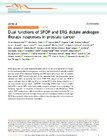Dual functions of SPOP and ERG dictate androgen therapy responses in prostate cancer
Abstract
Driver genes with a mutually exclusive mutation pattern across tumor genomes are thought to have overlapping roles in tumorigenesis. In contrast, we show here that mutually exclusive prostate cancer driver alterations involving the ERG transcription factor and the ubiquitin ligase adaptor SPOP are synthetic sick. At the molecular level, the incompatible cancer pathways are driven by opposing functions in SPOP. ERG upregulates wild type SPOP to dampen androgen receptor (AR) signaling and sustain ERG activity through degradation of the bromodomain histone reader ZMYND11. Conversely, SPOP-mutant tumors stabilize ZMYND11 to repress ERG-function and enable oncogenic androgen receptor signaling. This dichotomy regulates the response to therapeutic interventions in the AR pathway. While mutant SPOP renders tumor cells susceptible to androgen deprivation therapies, ERG promotes sensitivity to high-dose androgen therapy and pharmacological inhibition of wild type SPOP. More generally, these results define a distinct class of antagonistic cancer drivers and a blueprint toward their therapeutic exploitation. Show more
Permanent link
https://doi.org/10.3929/ethz-b-000520825Publication status
publishedExternal links
Journal / series
Nature CommunicationsVolume
Pages / Article No.
Publisher
NatureOrganisational unit
09703 - Alimonti, Andrea / Alimonti, Andrea
More
Show all metadata
ETH Bibliography
yes
Altmetrics



